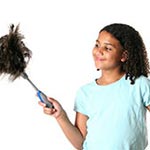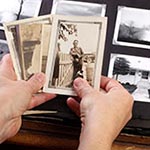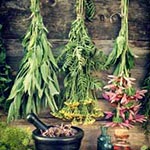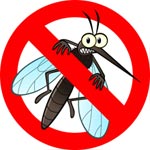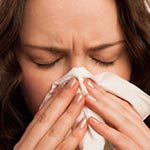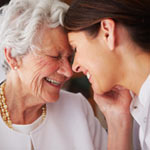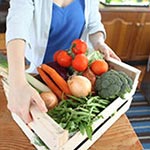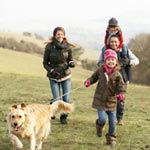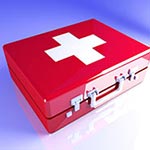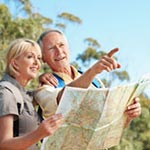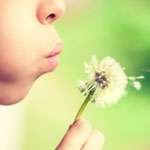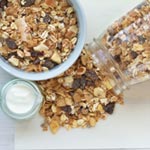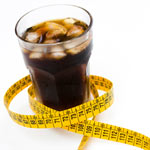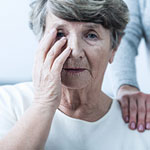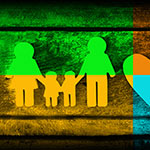5 Backyard Grill Safety Tips

People love a good backyard barbeque. They’re great for bonding with family and friends, or meeting new neighbors. There’s so much to do and so much fun to be had. With all the commotion, it’s important to remember plenty of potential accidents could happen if the head chef doesn’t understand how to safely operate their grill. To reassure yourself of your grill knowledge, check out these five ways you can help avoid grill problems at your next backyard party.
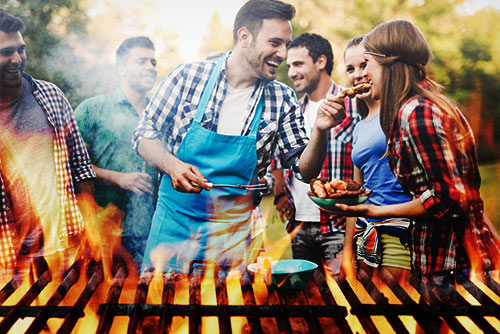
-
Know your grill
Gas-
Check for leaks
At the beginning of every grill season, be sure to check for any gas leaks before igniting your grill. Turning the grill on while there is a leak in the tank can cause backyard fires, which may lead to injuries. You can check for leaks by using a spray bottle containing a mixture of water and liquid detergent to spritz different areas of the propane tank. If bubbles appear as you slowly turn the gas on, you most likely have a leak and will need to tighten the tank’s connections or take the cylinder to a gas supplier for inspection. -
Keep it far from flammable items
When setting up your grill, make sure you consider the location. Refrain from setting it up near anything that could burn, such as your house, bushes, or tree branches.2 -
Clean the grill and tray
To put it in perspective, 20% of grill fires happen because fat or grease was left on the grills from previous sessions. After each grilling session, it’s important to scrub the area where the food was cooked. When the grease and fat gets left behind and hardens, it gives the flames something to catch onto when the grill is next started. Rather than having a small spark to begin heating the grill, large flames can jump up very quickly, and without anticipation, those flames can catch on to other items around the grill.2 -
Keep the lid open when igniting
For the safety of you and everyone around you, it’s essential you leave the lid open when starting your grill. If the lid is closed, all the gas gets trapped in the chamber, so when you go to ignite it, the spark has a little too much to grab onto.
-
Three-foot radius
When setting up a charcoal grill, be sure there is no less than a three-foot radius from anything flammable.2 This helps you gauge a safety perimeter, helping prevent any unwanted flames. -
Clean the grill so the old grease and fat is removed
Whether you have a gas or charcoal grill, this principle always applies. The left over grease and fat is very flammable, and can add uncontrollable flames to your grill. -
Use starter fluid per the products instructions
Keep in mind that every product is different. Although you may have used a charcoal grill or lighter fluid previously, remember their instructions may vary. Be sure to thoroughly review those directions before you begin. -
Lighter fluid storage
Be sure to read up on how the lighter fluid should be stored. Most fluids are acceptable to store in a cool and dry area such as a pantry or cabinet. A good rule of thumb is to always make sure it is out of reach of children and pets. -
Wait for the coals to cool
Before trying to clean the grill and get rid of the coals, be sure they have chilled to a reasonable temperature for you to manage.
While these tips are a useful start, make sure you read the product manual for your grill to be sure you aren’t missing any important information.
-
Check for leaks
-
Always pay attention!
Barbeques and block parties can be a great time since you have the opportunity to socialize, which also increases your distractions. Always ensure there is someone to tend the grill when you step away. It's also important to make sure children and pets get no closer than three feet while the grill is hot. -
Take precaution when handling food
- Wash your hands and sanitize any area you will be putting your food—especially your meats and fish.
- Keep your meat and fish cold until you’re ready to put it on the grill, don’t have it sitting out. The ‘two-hour’ rule states that it is no longer safe to eat any kind of meat after it’s been left out at room temperature for two hours because the amount of bacteria has reached an unsafe level for consumption. It’s recommended that you throw it out as it can’t be salvaged through cooking or refrigerating.
- Preheat the grill before cooking to ensure the meat cooks properly at the correct temperature.
- Make sure all meat and fish is cooked thoroughly. You can do this by using a meat thermometer to check if it has reached its recommended cooked temperature. Remember recommended meat temperatures vary.
- Be sure to use a fresh, clean plate for the fully cooked products. Using the same plate as you prepped on can lead to food-borne illnesses such as salmonella.2
-
Don’t wear loose-fitting clothing
Clothes that are baggy or flow easily in the wind can lead to a possible injury or burn. Fitted clothing and short-sleeved shirts are recommended for grilling as they are further away from your food and won't dangle over the fire. -
Keep a fire extinguisher nearby
Unfortunately, accidents happen. On the off chance a small fire does start, always be prepared. Keeping a fire extinguisher within a couple steps of your grill will help you to be able to control the situation.
With these safety tips in mind, prepare carefully for your next backyard rendezvous. Just know, if a fire does start, it’s never a bad idea to call the fire department to aide in keeping you and all your guests safe. Happy grilling!
Sources:
2. Quickseries.com. Keep Outdoor Cooking Safe. 2018.
3. Oureverydaylife.com. How Long Can Raw Meat Sit Out? 2019.
4. Mashed.com. How to tell if Your Meat is Cooked without Cutting It.
5. Safety.lovetoknow.com. Outdoor Cooking Safety.
You might also be interested in...
-
 10 Cheap Activities For Family Fun Night
10 Cheap Activities For Family Fun Night
-
 8 Habits that Could Be Hurting Your Marriage
8 Habits that Could Be Hurting Your Marriage
-
 The Benefits Of Coconut Milk
The Benefits Of Coconut Milk
-
 Top Tips For Bone Health For Women
Top Tips For Bone Health For Women
-
 Caring for Both Your Children and Your Parents
Caring for Both Your Children and Your Parents
-
 Debunking Common Relationship Myths
Debunking Common Relationship Myths
-
 Family Life Insurance for Young Families
Family Life Insurance for Young Families
-
 Five Expensive Home Improvement Projects that Won’t Boost Value
Five Expensive Home Improvement Projects that Won’t Boost Value
-
 Five Home Improvement Projects that Pay Off
Five Home Improvement Projects that Pay Off
-
 Health Benefits Of Cashews
Health Benefits Of Cashews
-
 Help Your Aging Parents Prepare for Retirement
Help Your Aging Parents Prepare for Retirement
-
 How to Get the Grandkids to Help with Chores
How to Get the Grandkids to Help with Chores
-
 How to Prepare a Family History for the Younger Generations
How to Prepare a Family History for the Younger Generations
-
 Is Herbal Medicine The Way To Go
Is Herbal Medicine The Way To Go
-
 Natural Mosquito Repellants
Natural Mosquito Repellants
-
 Planning Ahead: Family Life Insurance
Planning Ahead: Family Life Insurance
-
 How To Prevent The Common Cold And Flu Virus
How To Prevent The Common Cold And Flu Virus
-
 Taking Care Of The Caregiver
Taking Care Of The Caregiver
-
 Ten Best Fruits, Vegetables, and Herbs Families Can Grow at Home
Ten Best Fruits, Vegetables, and Herbs Families Can Grow at Home
-
 Ten Tips for Successful Single Parent Families
Ten Tips for Successful Single Parent Families
-
 Top 10 Health And Safety Tips For Fall And Winter
Top 10 Health And Safety Tips For Fall And Winter
-
 Top Ten Household Safety Tips
Top Ten Household Safety Tips
-
 Why All Women Need Life Insurance Too
Why All Women Need Life Insurance Too
-
 Why you should go on vacation
Why you should go on vacation
-
 Who Should Be Your Beneficiary
Who Should Be Your Beneficiary
-
 The Benefits Of Vitamin B
The Benefits Of Vitamin B
-
 5 Reasons To Eat Homemade Chicken Noodle Soup
5 Reasons To Eat Homemade Chicken Noodle Soup
-
 6 Healthy Breakfast Ideas
6 Healthy Breakfast Ideas
-
 5 Tips To Prepare For Allergy Season
5 Tips To Prepare For Allergy Season
-
 Unusual Ways To Keep Your Mind Sharp
Unusual Ways To Keep Your Mind Sharp
-
 Food That Isn’t As Healthy As You Think
Food That Isn’t As Healthy As You Think
-
 4 Things That Are Secretly Killing Your Healthy Lifestyle
4 Things That Are Secretly Killing Your Healthy Lifestyle
-
 Questions You Need To Ask At Your Next Checkup
Questions You Need To Ask At Your Next Checkup
-
 How To Make A Comeback After An Illness
How To Make A Comeback After An Illness
-
 4 Benefits Of Water Most People Don’t Know
4 Benefits Of Water Most People Don’t Know
-
 Heartfelt Advice To Avoid Heart Disease
Heartfelt Advice To Avoid Heart Disease
-
 What Is Respite Care And Are You One Of Millions Of People That May Need It?
What Is Respite Care And Are You One Of Millions Of People That May Need It?
-
 Three Tricks To Healthy Eating
Three Tricks To Healthy Eating
-
 How Important Is Estate Planning?
How Important Is Estate Planning?
-
 5 Backyard Grill Safety Tips
5 Backyard Grill Safety Tips
-
 Combining Insurance After Marriage: Updating Your Life and Health Policies
Combining Insurance After Marriage: Updating Your Life and Health Policies
-
 Top 5 Crazy Food Options at Globe Life Park, Home of the Texas Rangers
Top 5 Crazy Food Options at Globe Life Park, Home of the Texas Rangers
-
 4 Dangers of Owning an Exotic Pet
4 Dangers of Owning an Exotic Pet
-
 4 Ways Life Insurance Helps Families Plan for the Future
4 Ways Life Insurance Helps Families Plan for the Future
-
 Why Young Families Need Life Insurance
Why Young Families Need Life Insurance
-
 Reasons to Consider Travel Insurance
Reasons to Consider Travel Insurance
-
 3 Ways to Know It's Time to Increase Your Life Insurance Coverage
3 Ways to Know It's Time to Increase Your Life Insurance Coverage

 Insurance products are available in New York from
Insurance products are available in New York from  Insurance products are available in your state from
Insurance products are available in your state from 
















